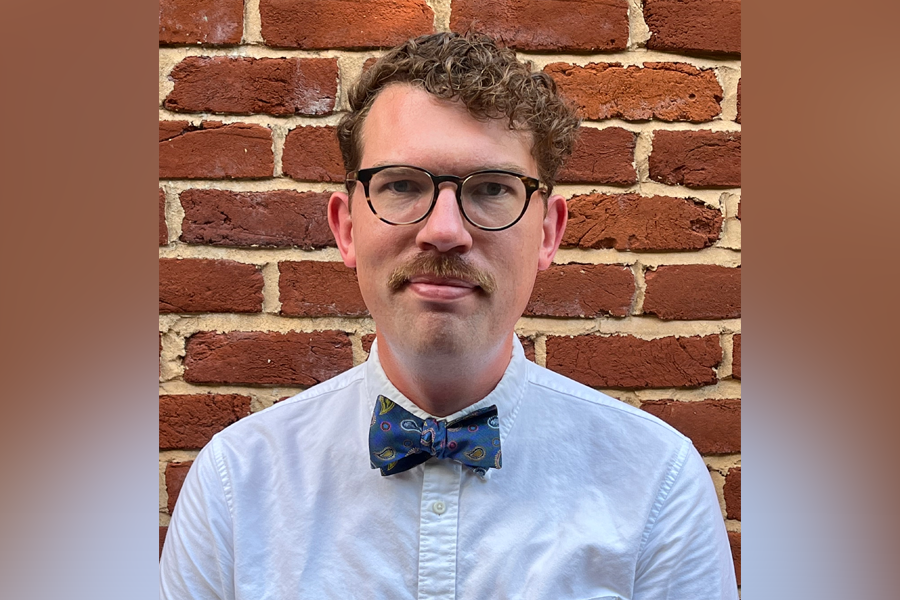Postdoc Spotlight: Dylan K. Rogers

Dylan K. Rogers is a postdoctoral scholar and teaching faculty in the Department of Classics, part of Florida State University’s College of Arts and Sciences. He earned his bachelor’s degree at Tulane University in 2008 and his master’s and doctoral degrees from the University of Virginia in 2010 and 2015 respectively. He previously lived and worked in Greece from 2015-19 and returned to America to be a lecturer in Roman art and archaeology at the University of Virginia from 2019-22. His doctoral dissertation, “Water-Display and Meaning in the High Roman Empire,” explores the placement of ancient Roman fountains in civic, religious, and entertainment-related spaces, which laid the foundation for his first book, “Water Culture and Roman Society.” At FSU, Rogers has continued his research on Roman fountains as well as Greek and Roman religion, the topography of the city of Athens and the reception of antiquity from the Renaissance to modern day.
Tell us a little about your background.
I'm a classical archaeologist, which means I specialize in the ancient Greek and Roman world. I study Roman fountains and urbanism, namely, how cities are laid out and how they are experienced and understood. This interest started when I was in high school on a trip to Italy as a foreign exchange student. Once I began my undergraduate studies, I knew I wanted to be a classical studies major. Then, I moved to the University of Virginia to pursue a doctoral degree in classical archaeology and have since excavated at Pompeii, in Sicily, in Turkey, and in Greece. I’ve also done field work in Jordan, Egypt, Germany, Spain, Portugal and Britain.
What brought you to FSU?
The Department of Classics at FSU is world renowned. With a robust faculty of both archaeologists and philologists, being experts in Latin and Greek, the department is a vibrant place to teach and to research. My position also allows me to work with both undergraduate and graduate students, which allows for even greater engagement with the ancient world. I came to FSU in August 2022, and I’m very honored to be able to collaborate with everyone in the department.
What inspired you to choose your specific area of research?
My father was in the Navy, so we moved to Italy when I was five. Because of this, I was exposed to the glories of Italy at a very young age. I remember visiting the Colosseum in Rome as well as the city of Pompeii. In middle school, my father was stationed in Norfolk, Virginia, and I then took a great interest in learning the Latin language in Virginia’s public schools. All these experiences spurred my passion to pursue research in the ancient world.
What aspects of your area of study do you find most fascinating?
One specific aspect of my work is studying Roman fountains and trying to understand actual experiences of the past. Every fountain, especially those that are now ancient and dry, has been surrounded by lived experience and traditions for centuries. Even at FSU, my students and I have had conversations about what the Wescott fountain means to them and their experiences here.
Can you give us an overview of the day in a life as a postdoc?
My daily goal is to interact with FSU students as much as possible. I want them to be excited about this field of study, so when I teach classes, I do my best to get my students outside of the classroom. Last semester, my Greek Sanctuaries course explored commemorative landscapes of by examining memorials around FSU’s campus, like the Legacy Walk, and understanding what sacred space means by visiting the Co-Cathedral of St. Thomas More across from FSU’s new Student Union. I want my students to observe their surroundings and to make their own connections between the past and today.
How do you work with FSU’s faculty?
In a postdoctoral position, you typically have a research mentor. My mentor, professor of classics Andrea U. De Giorgi, is not only a wonderful mentor but also an incredible scholar, teacher and person. I’ve found that students and colleagues at FSU, no matter the department, are wonderful to be around. I’ve even begun collaborating with folks from the Department of Sport Management in the College of Education for my Sport in Antiquity course this semester. Last semester, I was offered the opportunity from the Office of Postdoctoral Affairs to be a judge in the Three Minute Thesis competition. There are so many opportunities at this university, and I’ve only just started exploring them!
What do you want the public to know about what you do?
Academia has provided many others and me a lot of skillsets. Last semester, I taught a graduate course on Turkish archeology, and instead of having my students do a term paper at the end of the course, I encouraged them to make podcasts. The website showcasing all of their research, Anatolian Archeology, is open to the public. This is just one example of ensuring that my field is accessible to anyone who is interested, because I believe that one important element of academia today should be an engagement with those outside the “Ivory Tower” to break down barriers.
Following the completion of your postdoctoral appointment, what are your plans?
My dream is to work in a tenured position at a university. It’s difficult to secure a tenured position in any field these days, but I’m working hard to reach my dream by continuously building my skillsets, specifically teaching and keeping up with my research.
What advice would you offer to undergraduate students, graduate students, and fellow postdoctoral researchers?
Just enjoy yourself, especially here at FSU. Use the training that you received as an undergraduate or a graduate student. Use your passions and pay it forward. There’s a lot of love and support on this campus. We're here because we're passionate, so embrace that passion.

